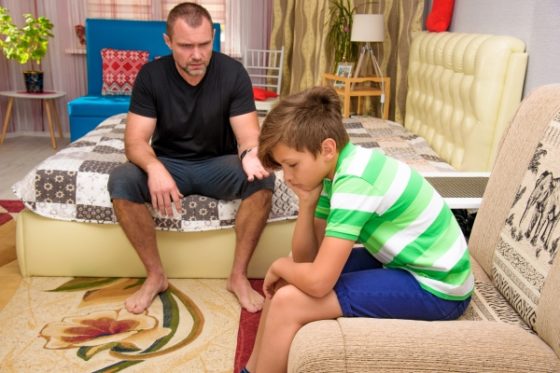Eight Components Of Parental Alienation Syndrome
Parental Alienation Syndrome, or PAS, is often seen in children of divorce, especially when there’s conflict in their parent’s relationship. It significantly affects both alienated parents and their children.
Philip M. Koszyk, MD, and William Bernet, MD, explain in PsychiatricTimes that “children of PAS are at increased risk for future trust and relationship issues, depression, and substance abuse. For a rejected parent, the pain is excruciating.”
Parental Alienation Syndrome (PAS), according to socialworktoday.com, is defined as a mental condition formed through “a set of strategies that a parent uses to foster a child’s rejection of the other parent.
[PAS] develops in children who come to hate, fear, and reject the targeted parent as someone unworthy of having a relationship with them.” In other words, one parent successfully manipulates their child, or children, against the other.
Richard Gardner, Ph.D., who coined the term, stated in The Parental Alienation Syndrome: A Guide for Mental Health and Legal Professionals that there are eight behavioral components of PAS. And this validation is from a survey of 68 parents whose children suffer from severe cases of PAS.
This study was published in 2007 in the Journal of Divorce & Remarriage by Amy J. L. Baker, Ph.D., and Douglas Darnall, Ph.D. According to socialworktoday.com, the eight components of Parental Alienation Syndrome include:
1. A Campaign of Denigration
Alienated children harbor ill feelings toward the alienated parent. The children deny any positive past experiences with this parent. They reject all forms of communication. Seemingly overnight, the alienated parent goes from being loved to absolutely hated.
2. Weak, Frivolous, and Absurd Rationalizations
When a child with PAS is questioned about their reasoning for the intense hostility toward the alienated parent, they do not offer any explanations. “The explanations offered are not of the magnitude that typically would lead a child to reject a parent.
These children may complain about their parent’s eating habits, food preparation, or appearance. They may also make wild accusations that could not possibly be true.”
3. Lack of Ambivalence About the Alienating Parent
Children with PAS favor the alienating parent, “demonstrating an automatic, and unrealistic support. They believe one parent is perfect while the other is imperfect.
If an alienated child is asked to identify just one negative aspect of the alienating parent, they will probably draw a complete blank. This presentation contrasts the fact that most children have mixed feelings about even the best of parents and can usually talk about each parent as having both good and bad qualities.”
4. The “Independent Thinker” Phenomenon
Even though their favored parent may influence the children, they will insist that rejecting the alienated parent is theirs alone. They vehemently deny their feelings about the alienated parent, influenced by the favored, alienating parent.
5. Absence of Guilt About the Treatment of the Targeted Parent
Children suffering from PAS appear “rude, ungrateful, spiteful, and cold toward the alienated parent.” These children do not feel gratitude for gifts, favors, or gestures from the alienated parent.
They do not view these gifts, favors, or gestures as an indication of having a loving parent but as a payment of a debt owed to them. Additionally, these children seem to be immune to feelings of guilt regarding their rough treatment of the alienated parent.
6. Reflexive Support for the Alienating Parent in Parental Conflict
“Intact families, as well as recently separated and long-divorced couples, will have occasion for disagreement and conflict. In all cases, the child will side with the alienating parent, regardless of how absurd or baseless that parent’s position may be.
There is no willingness or attempt to be impartial when faced with interparental conflicts. Children with [PAS] have no interest in hearing the alienated parent’s point of view. Nothing they could do or say makes any difference to these children,” as explained on socialworktoday.com.
7. Presence of Borrowed Scenarios
Often, children with PAS will make accusations toward the parent using keywords, phrases, and ideas from the alienating parent. “Indications the accusations are from the alienating parent include the use of words or ideas the child does not appear to understand. And speaking in a scripted or robotic fashion, as well as making accusations without details.”
8. Rejection of Extended Family
The children’s hatred of the alienated parent spreads to their extended family. “The targeted parent is denigrated, hated, and avoided, and so is their extended family. Formerly beloved grandparents, aunts, uncles, and cousins are suddenly and completely avoided and rejected.”
The only exception to this rule comes from family members who have a healthy relationship with the alienating parent. Children with Parental Alienation Syndrome will adopt the attitude of their favored parent in relationships with family members of the alienated parent; if the parent accepts and loves the family member, then the child will too.
Parental Alienation Syndrome is a tragic situation for parents and children, as both can feel immense grief. But the good news is that PAS is preventable. To prevent any favoritism from developing, a child must spend equal time with both parents.
“…It is essential to educate psychiatrists, psychologists, social workers, lawyers, and judges regarding [PAS], so they can help parents avoid this catastrophe when parents take steps to end their marriages.
It is also essential that the default arrangement for children after parental divorce should be joint custody. Typically, shared parenting means that the child lives with both parents at least 40% of the time. A common arrangement is for the child to alternate living a week in each parent’s home,” Philip M. Koszyk, MD, and William Bernet, MD, explain in PsychiatritTimes.
If you are an alienated parent, there is still hope to salvage your relationship with your child. There are many family therapists with experience on how to deal with Parental Alienation Syndrome. There is no shame in asking for help.
Here are some child custody battle mistakes to avoid.







